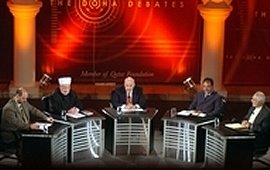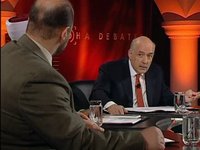This House believes that the war on terror has become a war on Islam
Thursday April 28 2005
MOTION REJECTED
by 50% to 50%
Details

This month’s Doha Debate asks whether the war on terror has become a war on Islam
DOHA—This week, former Iranian president Hashemi Rafsanjani became the lat est in a long line of politicians and pundits to declare that the United States-led war on terror is, in fact, a war on Islam.
Is that too sinister a reading of American motivations—is the war on terror a well intended campaign led by the only nation powerful enough to see it through? Or is it not sinister enough—is the US driven by an imperial ambition that does not differentiate between Christian and Muslim?
Last May, Abdel Rahman al-Rashed, general manager of Al-Arabiya news channel, wrote in a widely published editorial that “It is a certain fact that not all Muslims are terrorists, but it is equally certain, and exceptionally painful, that almost all terrorists are Muslims.”
If that is true, why is it so? If it is not true, why do so many people around the world, Muslim and non-Muslim, believe that it is?
This Thursday, April 28, four distinguished speakers will explore the se and related arguments in the sixth in the series of Doha Debates, presented by the Qatar Foundation for Education, Science and Community Development.
Chaired by former BBC presenter Tim Sebastian, the Doha Debates revolve around a motion presented to a live audience—in this case, 'This House believes that the war on terror has become a war on Islam.' Two speakers argue for the motion and two speak against it. Sebastian draws out the speakers, challenging their positions, and then opens the debate to questions from the audience. Finally the audience votes to accept or reject the motion, based on the merits of the arguments the speakers have made.
Speaking in favor of the motion will be Dr. Mustafa Ceric, the Grand Mufti of Bosnia, who has been active in efforts to counter fears about Islam since the attacks of September 11, 2001. He will be joined by Anas Altikriti, a founder and former president of the Muslim Association of Britain and an organizer of demonstrations against the war in Iraq.
Speaking against the motion will be Imam Feisal Abdul Rauf of New York City, founder of the American Sufi Muslim Association and the Cordoba Initiative, an inter-religious effort to improve relations between the US and the Muslim world. He will be joined by Ramzi Khoury, advisor to the editor-in-chief of the Saudi Gazette.
The Doha Debates are just one initiative in the Qatar Foundation’s mission to promote active, participatory education in Qatar and the region. The foundation’s flagship project is Education City, a 2,500-acre campus outside Doha that hosts branch campuses of four of the world’s top universities, as well as various other learning institutions and research centers.
“We hope to promote free and open debate, encourage people to question politics and politicians and to examine the burning, controversial issues that affect this part of the world,” Sebastian says. “We want people to see debate as a vital component of a functioning democratic society.”
The Doha Debates are taped in the foyer of Qatar Foundation’s headquarters in Education City before a live audience, about half of whom are students. BBC World has broadcast the past three debates in their entirety. This Thursday’s debate will also run on BBC World, on May 7 and May 8.
Past motions have included 'This House believes that George W. Bush has kicked open the door to democracy in the Middle East,' 'This House believes the Middle East road map for peace is dead' and 'This House believes in separation of mosque and state.' Past speakers include former Malaysian Prime Minister Mahathir Bin Muhamad, Egyptian scholar and dissident Saad Eddin Ibrahim, former Iraqi UN Ambassador Mohammed Al Doury, historian and pundit Fouad Ajami and former MI6 agent Alastair Crooke.
Watch online

